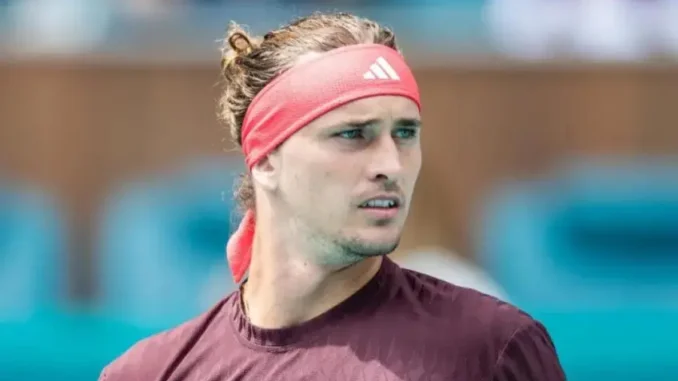
Alexander Zverev, the towering German tennis star with a game as commanding as his 6-foot-6 frame, has always been a figure of immense promise on the ATP Tour. At 27, he’s notched an enviable resume—two ATP Finals titles, six Masters 1000 trophies, and an Olympic gold medal from the 2021 Tokyo Games. Yet, the elusive Grand Slam title remains just out of reach, a persistent shadow over his otherwise glittering career. As the 2025 season unfolds, Zverev has opened up about what he believes he needs to reclaim his brilliance and finally hoist that coveted Major trophy, offering fans a glimpse into the mind of a player determined to rewrite his story.
It’s been a rollercoaster few years for Zverev. In 2024, he came agonizingly close to breaking his Grand Slam duck, reaching the Roland Garros final only to fall to Carlos Alcaraz in a grueling five-set battle. That loss stung, but it wasn’t the only near-miss. The Hamburg native has tasted defeat in two Major finals now—first in 2020 at the US Open against Dominic Thiem, where he squandered a two-set lead, and then again in Paris. Despite these setbacks, Zverev’s consistency last year was undeniable. He reached at least the round of 16 in every Masters 1000 event he entered, won titles in Rome and Paris-Bercy, and finished the season as World No. 2 behind Jannik Sinner. Still, for a player of his caliber, anything short of a Slam feels incomplete.
Reflecting on his journey in a recent interview, Zverev didn’t mince words about what’s holding him back. “I had a very stable season, except for the few tournaments where I had real physical problems,” he said, his tone a mix of pride and frustration. “I was one set away from winning Roland Garros. I still think—and I stand by it—that I played my best tennis at Wimbledon this year, for the first time in my career.” That Wimbledon run, cut short by injury, was a bitter pill to swallow. “I’ve never played as well on grass as I did before my injury,” he added. “That was very, very bitter for me because I really saw the opportunities for the first time in my life on grass.”
So, what does Zverev believe he needs to shine again? It boils down to courage—mental toughness under the brightest lights. “I know I need to be braver if I want to finally lift a Major trophy,” he admitted, a rare moment of vulnerability from a player often seen as stoic. The German has pinpointed those clutch moments where nerves have betrayed him, like failing to serve out the US Open final in 2020 or letting Alcaraz seize control in Paris. It’s not about talent—his serve is a cannon, his backhand a weapon, and his court coverage remarkable for his size. It’s about mastering the mental game, that intangible edge that separates the greats from the near-greats.
Zverev’s 2024 season wasn’t without its highs. Beyond his Masters 1000 triumphs, he showed flashes of brilliance that reminded everyone why he’s been tipped as a future No. 1 since his teenage years. His Rome victory over Rafael Nadal on clay—a surface long dominated by the Spaniard—was a statement. His Paris-Bercy title, secured with a newfound aggression, hinted at a tactical shift. “In the latter part of the year, I stepped up my practice sessions and began to have a more aggressive attitude on the court,” he said, suggesting he’s actively working to shed the caution that’s cost him in the past.
As 2025 dawns, Zverev is gearing up for a pivotal year. He’s opted to skip the Davis Cup Finals to focus on his preparation, setting his sights squarely on the Australian Open in January. “The next AO will immediately tell us if the path taken is the right one,” he mused, aware that Melbourne Park could be the stage for his redemption. With Sinner and Alcaraz—both younger and already Slam winners—leading the charge, the pressure is on. Yet, Zverev sees opportunity amid the competition. “Despite the presence of two young champions, I must seize the chance to win a Grand Slam title,” he said, his resolve clear.
His team, led by his father Alexander Sr., remains his bedrock. The elder Zverev’s Soviet-style coaching—once strict with older brother Mischa, now more relaxed with Sascha—has shaped him into the player he is today. “The reason my relationship with my father works so well, still as a coach and companion in tennis, is because he had Mischa before,” Zverev explained. “He relaxed with me after 20 years. He had enough.” That familial bond, paired with his own growing maturity, could be the key to unlocking his potential.
Zverev’s journey back to the top won’t be easy. The tour is a gauntlet, and his body has betrayed him before—most notably in 2022 when a gruesome ankle injury at Roland Garros sidelined him for months. But at 27, he’s far from done. “I’ve won two Masters titles, I’ve played big finals, but at the end of the day, I want to go one step further,” he said, his ambition burning bright. For Zverev, shining again means conquering his demons, embracing bravery, and finally claiming the prize that’s eluded him. Tennis fans, hold your breath—2025 could be his year.
Leave a Reply